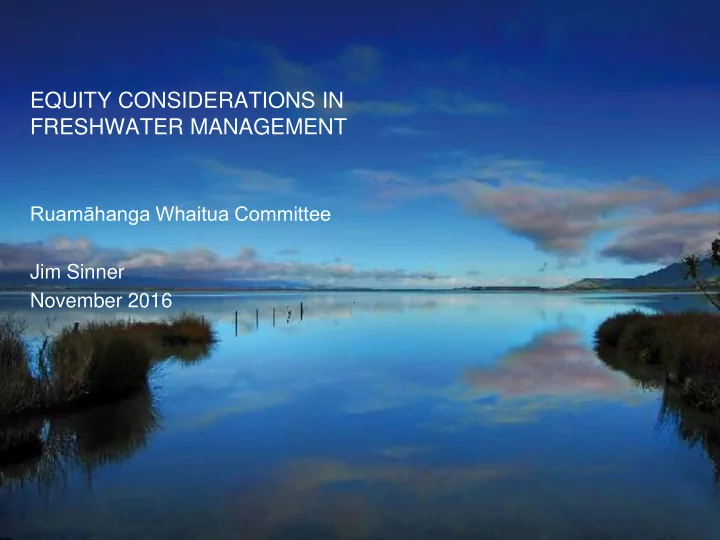

EQUITY CONSIDERATIONS IN FRESHWATER MANAGEMENT Ruamāhanga Whaitua Committee Jim Sinner November 2016
OUTLINE • Definition of equity • Equity principles • Equity issues Abstractive uses of water Discharges and habitat effects Inter-generational equity • Equity in modelling architecture Assessing equity in the decision-making process • Exercise – developing your own equity criteria •
EQUITY - DEFINITIONS Fairness or justice in the way people are treated -- how resources, costs and benefits are shared amongst individuals and groups within society
EQUITY - PRINCIPLES
EQUITY - PRINCIPLES Equality - Everyone should have the same • income, wealth or other opportunity Meritocracy - Everyone should have equal • opportunity at initial allocation; differences ok if they are the result of effort Minimum standard - No person’s income (or • allocation, in the case of water) should fall below a certain minimum level required to provide for basic needs
EQUITY - PRINCIPLES Pareto optimality - No one should be made • better off if it involves making someone else worse off Freedom to achieve potential - Everyone • should have an opportunity to meet their basic needs and human development potential … • And should not be inhibited from doing so by institutions that give privileged access to others.
EQUITY ISSUES – ABSTRACTIVE USES Equity between abstractive users – who gets the • water? First in, first served Use it or lose it Transferable water permits Auctions Over-allocated resources – who has to reduce? • • Equity between abstractive users and the public How much can be taken vs left in stream Should water users be charged rent?
EQUITY ISSUES – DISCHARGES AND HABITAT EFFECTS • Discharges, runoff and habitat changes cause adverse effects on in- stream uses & values What standards and limits for water quality? What requirements for habitat protection? Should in-stream users be compensated? How should discharge allocations and reductions be shared?
INTER-GENERATIONAL EQUITY • Fairness between current and future generations Some problems will take a long time to address • Equity issues include — • Speed of change vs. costs for current land users Incurring debt to finance change puts costs on future generations Water allocation – presumption of renewal of water permits
EQUITY IN MODELLING ARCHITECTURE • Equity is a filter for looking across multiple outcomes from a scenario Does the scenario address specific concerns about equity? Does the distribution of costs and benefits seem fair?
EQUITY AS A CRITERION FOR DECISION-MAKING • Identify equity issues that are of most concern Develop a specific principle: • “Everyone should have ...” “All landowners should have an equal opportunity to develop their land through irrigation” • Some principles might be mutually incompatible Can you write ‘conditions’ that resolve incompatible principles? Decide if some principles take precedence over others •
KEY POINTS Equity – fairness in access and in the distribution of benefits and costs • Equity principles – many suggestions • • Equity issues Abstractive uses of water Discharges and habitat effects Inter-generational equity • Assessing equity requires clear statements of principles (desired equity outcomes)
EQUITY CONSIDERATIONS IN FRESHWATER MANAGEMENT Questions?
EXERCISE - 1 • Individually, write down one or two equity issues that you would like the RWC to consider as it develops and assesses scenarios (2 mins) Draft a principle, a “should” statement, that describes an equitable • outcome for an equity issue (3 mins) Do two if you have time
EXERCISE - 2 • In groups of 2-3 committee members, share and discuss your draft principles (15 mins) Take turns sharing, one principle at a time, before there is any discussion Someone identify a principle from someone else that they agree with or would like to refine (maybe add conditions: “provided that”) Try to get agreed wording What question might you ask about a scenario to judge whether the principle has been satisfied? Repeat for another issue/ principle
EXERCISE - 3 • Report back (5 mins) Each group shares their suggested principles Are there other critical equity issues that have not been covered by those on the board? Any principles that are addressing essentially the same equity issue and could be combined?
NEXT STEPS • How does the Committee want to proceed? Unlikely to get full agreement on set of mutually compatible principles • Thinking about these principles will help you weigh up the scenarios • How well is each principle met? Is the overall distribution of costs and benefits fair?
Recommend
More recommend